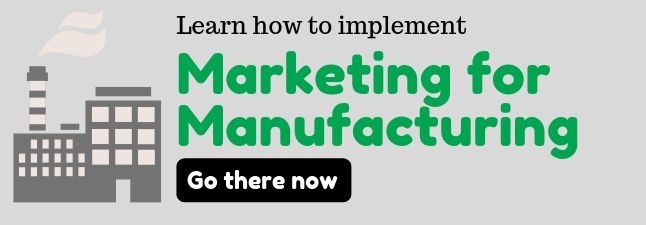Posted by Todd Hockenberry ● Jul 25, 2019
B2B Manufacturing Marketing vs B2C Consumer Marketing
We have all heard the now cliche comments about how buyers have changed and that the Internet gave the power to buyers and that companies need to change to adapt to these new facts. OK, we get it, the Internet has disrupted lots of things but what are B2B companies and manufacturers in particular supposed to do about it?
 First I would like to describe the main differences between B2B and B2C marketing and then what B2B companies should learn from the experiences the best B2C companies deliver. Let's look at four areas key areas and compare B2C to B2B marketing.
First I would like to describe the main differences between B2B and B2C marketing and then what B2B companies should learn from the experiences the best B2C companies deliver. Let's look at four areas key areas and compare B2C to B2B marketing.
Audience versus persona
Audience tends to be defined by demographics like age, location, job title whereas persona is more about behavioral traits like buying triggers, long-term goals, and competitive pressure. Audiences are more broadly defined and include many more people than a narrowly focused B2B persona. B2C marketers lean towards an audience approach where smart B2B marketers understand their target persona.
B2C looks to reach a decision-maker who is buying for themselves where a B2B marketer may be trying to influence a researcher who is not the ultimate buyer but is learning about options for a buying team. B2B marketers are trying to reach people that are buying for their businesses as a part of their jobs.
Brand Compared to Relationships
B2C marketing revolves around building the awareness and positive impression of a brand. We do not tend to have relationships with a brand but an affinity for them. The relationship is hands off and transactional.
B2B companies seek to build long-term relationships with buyers based on creating long-tem value resulting in a partnership. Brand is still important but the ways a brand develops in a buyer's mind is different than for B2C companies. B2B companies build their brand on the experience customers have at every touch point along a long, often chaotic, and detailed buyer journey.
Content and Search Intent
When people search for B2C products they are almost always trying to satisfy a want. Transactional sales typically are smaller so sellers need to drive volume traffic online and convert that traffic to many transactions. Searchers use third party social proof like ratings and reviews to build confidence in their purchase. Content tends to be lighter, more personal, and designed to drive lots of traffic.
Searchers online for B2B products are looking for specific solutions with goal of meeting a business need. Searchers tend to be niche or long tail and because the value of a sale is higher not as much traffic and conversions are needed to reach sales goals. References and case studies are common ways to establish trust and credibility to searchers of B2B products and services.
A Transaction or a Buying Process
Sales cycles tend to be short, sometimes minutes or less, for B2C products. There are few steps for the buyer to take and the transactional process often requires little research. The goal of the marketer is to make the sale at the lowest possible transaction and customer-acquisition cost. Emotion is often the main driver for the buyer and determines whether they complete the sale or not.
B2B sales cycles are much longer and may last years and involve many steps that do not include the B2B marketer. The goal of B2B marketers is to start the process and establish a connection with the contact buyer. Rational evaluation of options, investments, and competitors dominates the thinking of a typical B2B buyer
We suggest that there are three big things B2B, industrial, and manufacturing companies can learn from the success of B2C marketers.
Be findable
B2C marketers understand how to show up when people are looking for their products. B2B marketers must adopt the key principle of inbound marketing and get found by their target audience. B2B buyers control their attention just as much as consumers so B2B marketers have to earn that attention with helpful online content that helps and educates first thus earning the right to start the sales process.
B2B companies must share the product, technical, specification, training, and other product focused documentation. And they need to add to that the content buyers really want. Explainer videos, case studies, survey data, industry context, predictions for the future, and ultimately, answers to their questions whatever they are. This ability to answer their questions is the core of building a target persona and will largely determine the success of your getting found efforts.
Be available
If you are hiding behind an automated voicemail system then you are not available. Do you like sitting on a call waiting on hold? Why would you treat your buyers like that if you don't like it?
Does your site have a chat feature?
Do you have lots of FAQ documents on your site?
Are your service and account managements teams compensated on response times?
B2C marketers are very good at responding at speed because they realize that time is value for most buyers and the companies that make the experience easy and fast will win more often that not. Is speed of response important to your team?
Do you monitor social media for mentions?
Do you reply to Glassdoor posts about your company?
Modern buyers want your attention when they want it, not when you feel like giving it to them.
Be honest
Being honest is about being transparent. Most B2B companies do not really want to be honest about what is really happening.
If I can see where my $10 package from Amazon is at any time why shouldn't I be able to see where my $1 million machine is? Or don't you want me to know so you can hide the truth?
Open up your process to your buyers, it builds trust and confidence, and makes sure your entire team is accountable to the customer and that you are delivering a great B2B experience.
A great experience in the mind of the customer is the best competitive advantage you can build.
Topics: Marketing, Manufacturing








